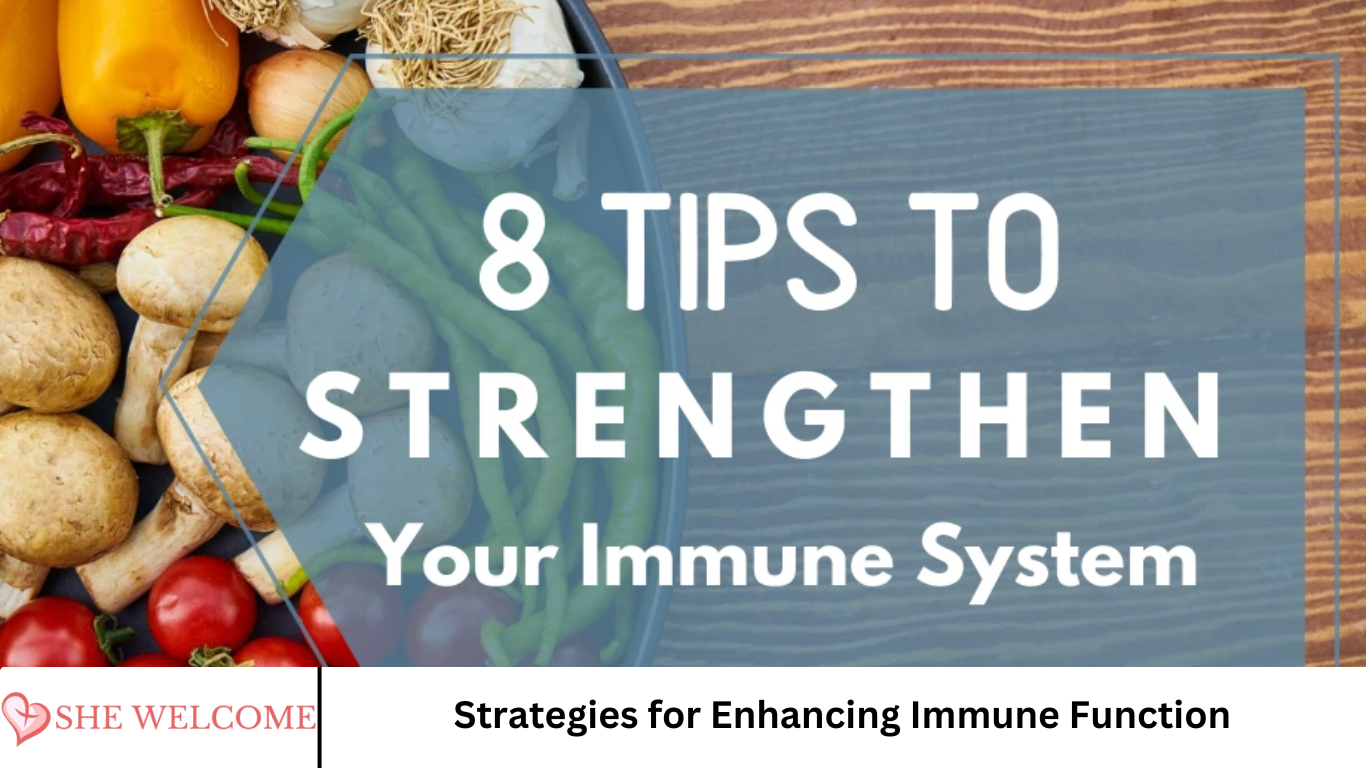The immune system acts as your body’s frontline defense, guarding against viruses, bacteria, and other pathogens. But even a robust immune system can falter due to stress, poor nutrition, or lack of sleep. So how do you enhance immune function effectively?
This comprehensive guide explores evidence-based strategies that strengthen your body’s defenses so you stay healthier and more resilient.
More Read: 8 Expert Tips from UCLA Health for a Healthier 2025
2. Understanding How Your Immune System Works
Before diving into strategies, it’s helpful to grasp how the immune system functions:
- Innate immunity: Your body’s first responder—barriers like skin, mucous membranes, and immune cells (e.g., macrophages).
- Adaptive immunity: A highly specialized system that targets specific invaders using T-cells and B-cells. After exposure, it develops memory—to react faster next time.
Key point: These systems require support—like nutrients and rest—to operate optimally.
3. Nutritional Strategies to Boost Immunity
Balanced Macronutrients
- Protein is essential. It supports antibody and immune cell production and repair.
- Healthy fats, especially omega-3s (e.g., fish, chia, flax), reduce inflammation and enhance cell signaling.
- Complex carbohydrates (whole grains, legumes) supply energy, but oversweets can suppress immune function.
Crucial Micronutrients
- Vitamin C: Vital for white blood cell production and antioxidant defense. (Sources: citrus fruits, berries, peppers)
- Vitamin D: Modulates immune response and supports macrophage activity. (Sources: sunlight, fortified foods, fatty fish)
- Zinc: Key for T-cell function and wound healing. (Sources: legumes, nuts, whole grains)
- Vitamin A, E, and B-complex: Support mucosal barriers and cellular immunity.
Eat the Rainbow: Fruits and Vegetables
- Diverse produce ensures a broad range of phytochemicals, antioxidants, and fiber.
- Prebiotics (e.g., onions, garlic, oats) feed gut microbes that regulate immune function.
Limit Processed Foods and Added Sugar
- Excess sugar and ultra-processed foods can promote chronic inflammation and impair immune cells.
4. Supplementation: What Science Shows
Supplements can support—but not replace—a balanced diet. Consult healthcare providers before use.
- Vitamin D3: Especially useful in low-sun environments; doses of 1,000–2,000 IU/day are often recommended.
- Zinc lozenges: May reduce duration of colds when taken early (within 24 hours of symptoms).
- Probiotics: Certain strains (e.g., Lactobacillus, Bifidobacterium) might reduce respiratory infections.
- Echinacea & elderberry: Preliminary studies show reduced symptom severity—more research needed.
- Astragalus, mushrooms (e.g., shiitake, reishi): Studied for immune-enhancing polysaccharides; results are mixed.
5. Lifestyle Habits That Strengthen Immunity
Prioritize Quality Sleep
- Aim for 7–9 hours nightly.
- Inadequate sleep disrupts T-cell activity and raises inflammation.
- Tips: Stick to a consistent schedule and create a sleep-promoting environment.
Reduce Stress
- Chronic stress raises cortisol, which suppresses immunity.
- Try mindfulness meditation, deep breathing, yoga, or journaling for stress relief.
Maintain Regular Physical Activity
- Exercise strengthens circulation and helps flush pathogens out of the lungs.
- Aim for at least 150 minutes of moderate activity (e.g., brisk walking) plus resistance training weekly.
- Avoid extreme overtraining, which can stress and weaken immunity.
Keep Proper Hydration
- Water supports lymph production, circulation, and detoxification.
- Drink moderate amounts—until your urine is pale straw-colored.
Practice Good Hygiene
- Regular handwashing and proper food handling reduce pathogen exposure.
- Stay updated on vaccines (flu, COVID, etc.) to prime adaptive immunity.
Limit Alcohol and Avoid Tobacco
- Excessive alcohol impairs immune cell function.
- Tobacco damages lung defenses and worsens inflammation.
6. Gut Health: A Key to Immune Vitality
Approximately 70% of immune activity takes place in your gut.
- Diversity of gut flora boosts production of short-chain fatty acids that regulate inflammation.
- Include fermented foods (yogurt, kefir, sauerkraut) or a trusted probiotic supplement.
- Prioritize prebiotic fiber: bananas, onions, garlic, artichokes.
- Avoid unnecessary antibiotics to preserve your microbiome.
7. Targeted Immune Support During Specific Situations
Cold & Flu Seasons
- Vitamin C (500–1,000 mg) at onset may reduce duration.
- Zinc lozenges (≤40 mg/day)—start early.
- Consider elderberry syrup or echinacea—research shows modest benefits.
Athletes & Frequent Travelers
- Endurance athletes or travelers may benefit from immune-support supplements such as probiotics or antioxidants—but consult a sports nutritionist or physician.
Older Adults & Immunocompromised Individuals
- Regular vitamin D monitoring, protein intake, and influenza vaccinations are crucial.
- Probiotics and micronutrient support can be especially beneficial—ask your doctor.
8. Common Myths Debunked
| Myth | Reality |
|---|---|
| Boosting immunity = unstoppable body | No single action guarantees no illness; it’s about resilience and reduced risk. |
| More vitamins = better immunity | Excessive supplementation can cause harm—for example, vitamin A toxicity or zinc interference with iron. |
| Herbal remedies always safe | Herbs have side effects and may interfere with medications. Consult your doctor. |
| Detox cleanses boost immunity | The liver and kidneys naturally detoxify; starvation cleanses can stress immune function and rebalance microbiota. |
9. Tracking Results and Adjusting Your Plan
- Keep a health journal: Record sleep, diet, symptoms, stress, supplements, and activity.
- Monitor performance: Fewer colds, faster recovery post-sickness are signs of a stronger immune system.
- Get checkups: Periodic lab tests (vitamin D, iron, CBC) can highlight deficiencies or concerns.
10. Putting It All Together: A Daily Immune-Building Routine
Morning
- 7–9 hours of good sleep
- Glass of water with lemon
- Balanced breakfast: Greek yogurt or eggs + fruit + whole grains + healthy fat
- 10-minute mindfulness or gratitude exercise
Midday
- Salad with lean protein, colorful veggies, seeds, and olive oil
- Movement break: quick walk/stretch
- Handwashing hygiene breaks
Afternoon
- Fresh fruit or veggie sticks
- Muscle-strengthening activity (bodyweight, bands, weights)
Evening
- Family walk or relaxation routine
- Light protein and vegetable dinner
- Herbal tea (chamomile or ginger)
- Power off screens 1 hour before bed
Frequently Asked Question
What are the most effective ways to enhance immune function naturally?
The most effective strategies include eating a nutrient-dense diet rich in fruits, vegetables, and lean proteins; staying physically active; getting quality sleep; managing stress; staying hydrated; avoiding smoking and excessive alcohol; and maintaining good hygiene.
Can vitamins and supplements really boost my immune system?
Certain vitamins and minerals—like vitamin C, vitamin D, zinc, and probiotics—can support immune function, especially if you have a deficiency. However, supplements should complement a healthy lifestyle, not replace it.
How does sleep affect the immune system?
Lack of sleep reduces the activity of immune cells such as T-cells and natural killer cells, and increases inflammatory markers. Consistently getting 7–9 hours of quality sleep helps your immune system stay alert and responsive.
Does exercise improve immunity or weaken it?
Moderate exercise (e.g., brisk walking, cycling, strength training) boosts circulation and immune cell activity. However, overtraining or extreme endurance activities without recovery can suppress immune function temporarily.
How does stress impact immune health?
Chronic stress raises cortisol levels, which can suppress the immune response, slow healing, and increase susceptibility to illness. Stress-reduction techniques like meditation, deep breathing, and regular relaxation can help restore balance.
Are there specific foods that support the immune system?
Yes. Immune-supportive foods include:
- Citrus fruits (vitamin C)
- Garlic and onions (antimicrobial and prebiotic)
- Leafy greens and berries (antioxidants)
- Yogurt and fermented foods (probiotics)
- Nuts and seeds (zinc, vitamin E)
How quickly can I strengthen my immune system?
You can make small gains—like improved sleep and hydration—within days. But building lasting immune strength requires consistent effort over weeks or months. Think long-term: immune health is a lifestyle, not a quick fix.
Conclusion
Enhancing immune function isn’t about taking a magic pill—it’s about adopting consistent, science-backed habits that support your body’s natural defenses. A well-balanced diet, quality sleep, regular physical activity, stress management, and targeted supplementation (when needed) all play a vital role in keeping your immune system strong and resilient. While no strategy can guarantee complete protection from illness, a healthy immune system helps reduce the risk, shorten recovery times, and improve overall well-being. Think of immune health as a lifelong investment—small daily choices that add up to lasting protection.


